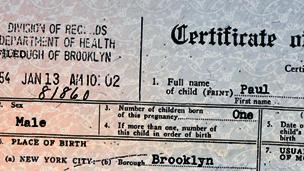Transgender Americans take on New York
- Published
- comments
Joann Prinzivalli says she believes a person's sexual identity is determined by their mind rather than their genitals
A group of transgender men and women want New York City to make it easier to change the "M" or "F" on their birth certificates. What makes a man or a woman, and why do governments care?
In the annals of unhappy encounters with driving licence authority officials, Patricia Harrington's and Joann Prinzivalli's seem particularly miserable.
Both had been living as women for years, but still carried birth certificates showing the sex they were designated at birth - male.
Ms Harrington, who was hoping to transfer her New York state driving licence to the state of New Jersey, was told to return with a doctor's note.
"It just made me furious," says Ms Harrington.
"I would just like to get a corrected birth certificate that identifies me, so that when I have to show it for identification I don't automatically become some kind of criminal suspect."
'It's personal'
New York City, where both were born, will amend a person's birth certificate, external to reflect a sex change, but only if the person has undergone "convertive surgery" on the genitals.

Joann Prinzivalli's birth certificate lists her as male; She says she is female
In practice, transgender people say, that means turning penises into vaginas or vice versa, and Ms Harrington is content to keep the male bits she was born with.
"It's personal, it's my privates, it's not necessary. It's a very expensive procedure which I can't afford, and it's got complications. I'm not sexually active. If I was 21 and I could afford it, yeah, but I'm 59."
Last year, Ms Harrington, Ms Prinzivalli and another transgender person sued the city of New York to force it to relax its birth certificate change requirements.
The suit is part of a quiet movement across the US and beyond to bring the rules governing identity documents into line with what transgender advocates describe as advances in the understanding of sex classification.
It is the contents of a person's mind and soul, they say, which determine sex - not what is inside their pants.
"Recognition of our gender is really a matter of basic human dignity," says Masen Davis, executive director of the Transgender Law Center in San Francisco.
"Transgender people - like all of us - deserve to live with dignity and respect. Having something as simple as government recognition of our authentic gender identity goes a long way in promoting health, wellness and safety."
Roadblocks and harassment
In the US, birth certificates can be required to apply for public benefits like food stamps and healthcare, for professional certification, to register for school, to marry, to prove employment eligibility, and in other circumstances.
Transgender Americans have complained of bureaucratic roadblocks and harassment when they produce a birth certificate that lists a sex different from the one they are living.
In interviews with transgender individuals, motor vehicle clerks seem especially unforgiving.
"When I showed them the birth certificate, the clerk behind the counter changed her demeanour and very loudly referred to me as 'sir' and 'this gentleman'," says Ms Prinzivalli, who has lived as a woman for more than a decade.
"It was a mortifying experience. I'm being stripped of my identity by some [motor vehicle] clerk that I have to treat respectfully. It took me days to start crawling back up out of the little hole I dug myself."
Success in California
The issue at stake in New York and elsewhere - both inside the US and overseas - is not whether transgender people should be allowed to amend identity documents (only a US handful of states forbid a birth certificate change outright).
Instead the debate centres on where officials draw the line between male and female.

Harrington needed to show her 'male' birth certificate when she moved house
The US government and many US states, as well as the UK and Australia, have done away with the requirement for surgery to convert the genitals. That is partly in response to transgender activists who say the requirement was based on an obsolete understanding of sexual identity.
In 2011 the Transgender Law Center successfully pushed for passage of legislation ending surgery as a requirement to obtain a new birth certificate in California.
In September, Australia began allowing transgender individuals to change the sex on their passports without having to undergo sex reassignment surgery; in October the nation's highest court gave legal recognition to two transgender men who had not had sex-change surgery.
Under the 2004 Gender Recognition Act, external, the UK does not require genital surgery before allowing individuals to obtain official recognition of their new gender.
And in 2010, the US State Department issued new guidelines, external requiring only "appropriate clinical treatment" to obtain a new passport or a birth certificate for US citizens born outside the country.
New York refuses
New York City's board of health and mental hygiene has resisted pressure to change its birth certificate policy.
In a 2006 ruling, external the board cited potential impacts on hospitals, schools and jails, and opted to maintain the genital surgery requirement.
So last year, Ms Harrington, Ms Prinzivalli and a transgender man who was designated female at birth sued the city, external.
The city has sought to have the suit dismissed, arguing that sex as recorded on the birth certificate refers to biological and physical characteristics like the nature of the genitals, while the lived experience of socially constructed roles are gender, a separate category.
"The utilisation of sex as a classification method is rational, since it is a straight forward way to ensure that birth records in the City of New York are uniform," lawyers for the city wrote in a court filing, external.
"The standard leaves little room for individual interpretation. By simply looking at a baby's genitalia, an individual is able to determine its sex."
The city says if it were to allow an individual like Ms Prinzivalli to obtain a new birth certificate with the different sex, it would be "knowingly issuing a false public record".
Transgender individuals and their advocates say the city's conception of sex is outdated and inappropriately narrow.
However, officials for the New York City department of health and mental hygiene did not respond to a request for comment.
Oral arguments in the case are scheduled for next month.
Permanent change
Genital surgery is complicated, risky, invasive and entails a long period of recovery, and the vast majority of transgender individuals have not undergone it. The procedures are also expensive and out of reach for many.
Only about 20% of male-to-female transgender people have had genital reconstruction surgery, and only about 5% of female-to-male, estimates Walter Bockting, a psychologist at the University of Minnesota medical school who has 20 years of clinical experience working with transgender patients.
Dr Bockting says a more appropriate standard for new identity documents would be evidence the role change is permanent and medically necessary to relieve the stress would-be transgender people experience from the conflict between their gender identity and their birth sex.
"People don't just change their role not knowing whether they're going to like it or not," Mr Bockting says. "It's not a casual decision."
Some, like Joanne Prinzivalli - whose birth certificate still lists her as Paul and as male - are medically precluded from the surgery.
Nick Gorton, an emergency room doctor who has lived as a man for about nine years and who says he has "perfect passing privilege" without genital surgery, ridicules governments' insistence that sex depends on what is between the legs.
"Let's say if a woman gets a really bad cancer and has to have a hysterectomy or a vaginectomy. Does she have to change her gender marker?"